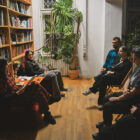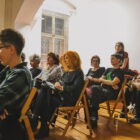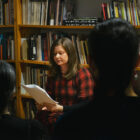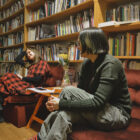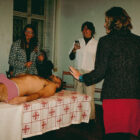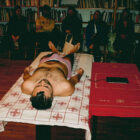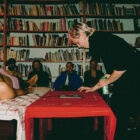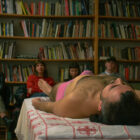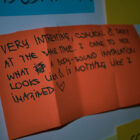25th International Feminist and Queer Festival Red Dawns
Literary evening: Feminist poetry with Ana Makuc
Tuesday, 5 March 2024, 6 pm
Slobodan’s New Materialisms: 40
Tuesday, 5 March 2024, 7.30 pm
Utopian round table: let’s build safer cultural spaces
Wednesday, 6 March 2024, 6 pm
Project Room SCCA, Metelkova 6, Ljubljana
SCCA-Ljubljana is hosting events in the frame of 25th International Feminist and Queer Festival Red Dawns, which takes place from 2 to 10 March at AKC Metelkova City.
Literary evening: Feminist poetry with Ana Makuc
Tuesday, 5 March 2024, 6 pm
Project Room SCCA, Metelkova 6, Ljubljana
In the Slovenian language
Free Entry
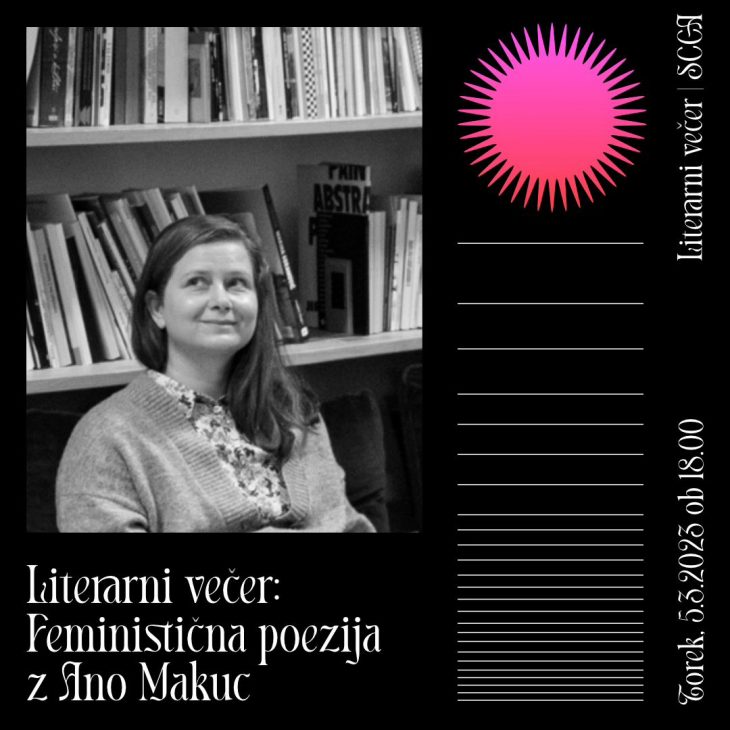
Ana Makuc will read poetry from her new poetry collection entitled I Smuggle Watermelons and her translation of Carol Ann Duffy’s poetry from the collection The World’s Wife, both of which will be published shortly by the Sophia Publishing House. What both poetry collections have in common is that they are distinctly feminist and written in the form of the dramatic monologue, by means of which the poets give a voice to those who are invisible and silenced in our society: women, children, refugees…
In her poetry collection The World’s Wife (Picador, 1999), Carol Ann Duffy, in thirty poems with thirty female speakers, gives to voice to those women who, as the saying goes, stand behind every ‘great’ man – whether real, historically attested, or fictional, mythological and biblical – so that we can see these men, such as Freud, Darwin, Orpheus, Odysseus, Faust, from the perspective of the bedroom, kitchen and bathroom, through the experiences of their wives, lovers and sisters. She does all this in a distinctly accessible, witty, humorous, playful, vivacious and at times offensive (satirical, parodic) way, and, first and foremost, in the form of the dramatic monologue, as this is the only poetry collection by Carol Ann Duffy written entirely in this form, although the dramatic monologue occasionally appears in her other collections as well. In the collection, Duffy aims to highlight how women have generally been ignored at best and silenced at worst throughout the centuries. The poet enters into dialogue with that aspect of Western ideology, which – in the languages of philosophy, science, art and religion – has reduced women to animality, intellectual inferiority, passivity and dependence. Thus, she draws attention to the cultural and social consequences of this legacy, which favoured the narrative of the ‘world’s husband’ for far too long.
Ana Makuc‘s second collection of poems, I Smuggle Watermelons, is, like her debut, Roland Bathers’ Lover (2015), written mostly in the form of the dramatic monologue. The present collection explores issues of motherhood, female body, violence, body boundaries and state borders from a feminist perspective, drawing parallels between the latter (hence the title of the collection), thematising borderline, intermediate, fluid, split subjectivities. In the collection, we can hear the voices of a pregnant woman, new mother, housewife, woman who survived domestic violence, raped woman, woman who had an abortion, pregnant refugee, partner of a serial killer, sex worker, woman with an eating disorder, mother with postpartum psychosis, depressed woman, autistic woman, poet, children, refugees. The author conveys social criticism through a mask/psychogram, the critique of patriarchal institutionalised violence that seeps into every pore of our private lives: physical, psychological (emotional, verbal), economic, sexual violence and/or domestic violence, heteronormative nuclear family, women’s unpaid and invisible reproductive (household and caring) work, curtailment of reproductive rights, European migrant policy, objectification of women, medical institutional treatment of female (pregnant) bodies. The very poetic form or subgenre of poetry, which has a long female writing literary tradition (it was invented by Victorian women poets), the dramatic monologue, empowers the speakers: these are not victims, but survivors (vulnerable, but strong – just like children), these are not objects, but subjects, these are not human trash, but persons, people with specific life circumstances.
Ana Makuc (1982) is a Slovene poet, translator and activist. She graduated in comparative literature and literary theory and English language and literature from the Faculty of Arts, University of Ljubljana, in 2008. In 2014, she obtained her PhD in gender and women’s studies from the Lancaster University, United Kingdom. Between the years 2014 and 2019, she was a co-creator of the International Feminist and Queer Festival Red Dawns. In 2016, she received the Veronika Award for the best poetry collection of the year for her debut Roland Barthes’ Lover (2015, KUD Apokalipsa). In 2022, her translation of bell hooks’ work entitled Feminism Is for Everybody: Passionate Politics was published by Sophia Publishing House. Her poetry, literary translations and scientific articles in the field of feminist literary criticism have been published in numerous journals and monographs.
Carol Ann Duffy (1955) is a Scottish poet, playwright, children’s writer and professor of contemporary poetry at Manchester Metropolitan University in Great Britain, otherwise a Bachelor of Philosophy. In 2009, she was named Poet Laureate of Great Britain and she is the first woman to ever receive this title. She is the author of numerous poetry collections (including Standing Female Nude (1985), Selling Manhattan (1987), Meantime (1993) and Rapture (2005)) and the recipient of several literary awards for poetry. Duffy is one of the most popular and prolific British poets. Her poetry is written in accessible language, as she says that she ‘likes to use simple words in a complex way’.
Slobodan’s new materialisms: 40
Tuesday, 5 March 2024, 7.30 pm, the installation will be on view at any time between 7.30 and 10.30 pm
Project Room SCCA, Metelkova 6, Ljubljana
Interactive performative audio-corporeal installation
In the universal language of Art
Free entry, collection of voluntary contributions
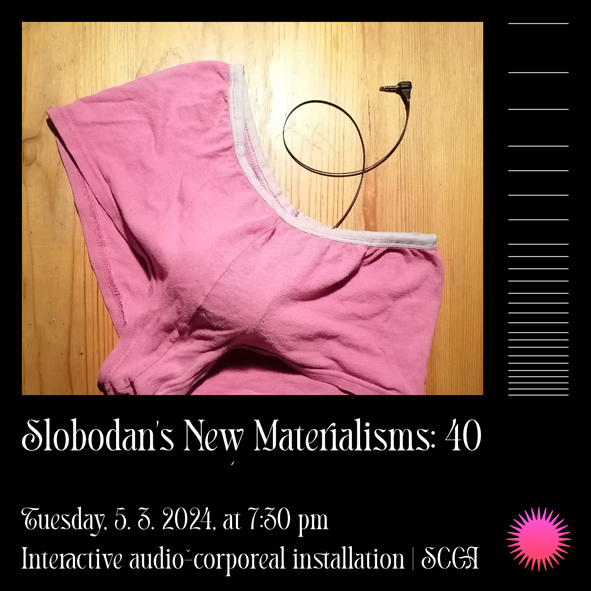
Slobodan’s new materialisms present themselves with an interactive performative sound-body installation titled 40. The three-hour work of art, which addresses the class dimension of cultural capital, tells the life story of a performer whose beginnings, imbued with trash aesthetics, arose in the autonomous spaces of Ljubljana. Slobodan’s New Materialisms draw the artistic expression from the political-activist involvement and are fueled by topics such as class, gender, queerness, mental health and migration. He is mainly interested in how these perspectives or personal circumstances coexist as an inseparable whole. 40 thus opens up a completely new space for reflection on vulnerability for the participants, in which they can even perceive it embodied in the performer. Radical statements connected with minimalistic means of realization, as we are used to by the artist, effectively communicate moving content, deeply immersed in the themes of queer-feminism, while at the same time, with light playfulness, they make deep and hurtful cuts in the fabric of heteronormative patriarchy, rooted in all of us, the viewers.
Slobodan’s new materialisms alias Slobodan Malić (1983) started performing at an early age. Univ. B.Sc. sociologist and French Linguist, works with various genres of performing arts since 2013. They continue her education and create as a performer, drag artist, movement artist, actor, producer and screenwriter. They perform both in autonomous spaces and in larger, more institutionalized ones. She has worked with various institutes, including the Kitsch Institute and the City of Women. He has been a member of the queer feminist collective Red Dawns for many years, creates in the collectives FEM TV and Cabaret Tiffany, and collaborates with various artists, including Bojan Jablanovec, Natasa Živković and Jaša Mrevlje – Pollak. They also perform in a play with the Theatre of the Oppressed method and have been developing in all aspects in the immersive theatre Dead End for many years. Her research interests include topics of gendered practices, hegemonic masculinity and power relations, home and migration, class and cultural capital, and the role of art as such. Since 2019, he has lived and worked between Berlin and Ljubljana.
Utopian round table: let’s build safer cultural spaces
Wednesday, 6 March 2024, 6 pm
Project Room SCCA, Metelkova street 6, 1000 Ljubljana
Slovenian
Free entry, collection of voluntary contributions
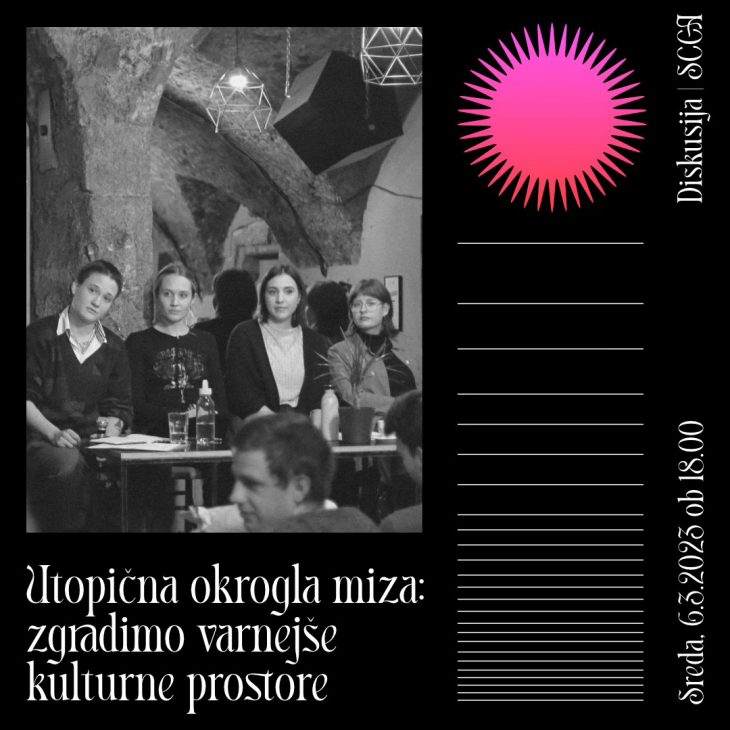
What are the reasons for the widespread occurrence and reproduction of gender-based violence within cultural and artistic spaces and communities?
As Carolin Emcke puts it in Yes Means Yes and… (2022) “Instead of repressing the act, we repress talking about it. Thus it is not the act that is tabooed, but the talking about the act.” (our translation) The round table will therefore raise questions of (in)action, silence and look for ways to break this mode of action. We will look for ways to create cultural spaces and nightlife that are more inclusive, safer, and enjoyable for all of us. Together (with you) we will map the main or recurrent problems of gender-based violence in our local music, visual arts, theater, and other cultural and artistic scenes, and look for concrete mechanisms for holding perpetrators accountable for their actions. We will discuss the different ways of intervening and providing support to those who experience violence and to those who intervene in such cases.
Above all, we will imagine, by questioning existing practices (effective and ineffective), what utopian cultural spaces would look like and answer the question of how to get there, and how to build them.
Ula Kranjc Kušlan is completing her master’s degree at the Faculty of Arts, where her thesis focuses on tolerance and normalization of different forms of sexual harassment and gender-based violence. Since 2022, she has been a co-founder and active member of the Rejv Utopija collective, which works to raise awareness and reduce sexual and gender-based violence in nightlife through various activities (fieldwork, educational workshops, roundtables, talks). Her fields of interest are also media, music, and culture in which she participates mostly through her work at Radio Študent and co-organizing of festival Tresk.
Lana Križaj is a member of the queer-feminist collective Ustanova and co-founder of an initiative Rave Utopia, which has been raising awareness about gender-based violence in nightlife with field interventions, workshops, and consultations since 2022. Lana is also writing a master’s thesis in cultural anthropology on the topic and runs workshops and participatory plays on the topic of prevention of peer violence and activation of non-violent masculinities.
Photo: Anna Dobrić
Organisation: 25th International Feminist and Queer Festival Red Dawns
Coproduction/co-organisation: Sophia Publishing House, Rejv Utopija, SCCA-Ljubljana
Design of the poster and graphic design: Ariane Podlesny
Photo: The Red Dawns’ Archive, Slobodan’s New Materialisms, Neža Bukovec
Contacts for media and press: Saša Nemec, rdece.zore@gmail.com
Financial support of the festival: City of Ljubljana – Department of Culture


